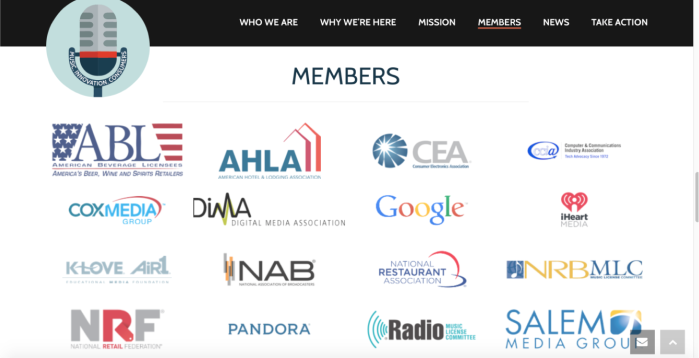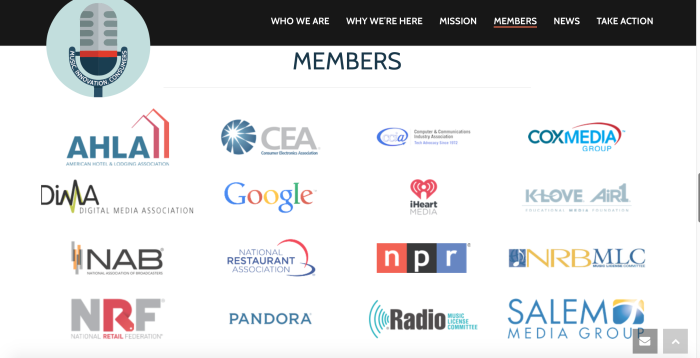We’ve noted a few times that there’s a limited benefit to ASCAP and BMI from being involved with the Music Modernization Act (although fans of the bill have been dining out on their support for quite a while). All of those benefits involve relief from the oppressive government control over songwriters through the ancient consent decrees that now mostly protect the MIC Coalition.
We’ve also pointed out that the new head of the Antitrust Division of the Department of Justice announced his plan to terminate the some 1,500 consent decrees that the DOJ uses to regulate commerce–more properly the role of the Congress, not the Justice Department. Assistant Attorney General Makan Delrahim, the head of the Antitrust Division, has already said that he would review the ASCAP and BMI consent decrees, so this isn’t idle speculation.
This week, the AAG Delrahim put that plan in motion. According to a DOJ press release, the Antitrust Division is terminating 19 consent decrees that are like the PRO consent decrees, more regulatory in nature than enforcement oriented. Here’s the press release:
The Department of Justice’s Antitrust Division today filed a motion and supporting papers, seeking to terminate 19 “legacy” judgments in the District Court for the District of Columbia. Today’s court filing is part of the Antitrust Division’s effort to terminate decades-old antitrust judgments that no longer serve their original purpose.
“Today we have taken an important next step toward eliminating antitrust judgments that no longer protect competition,” said Assistant Attorney General for Antitrust, Makan Delrahim. “Today’s filing is the first of many that we will make in courts around the country in our effort to terminate obsolete judgments.”
In its motion filed today, the Antitrust Division explained that perpetual judgments rarely continue to protect competition, and those that are more than ten years old should be terminated absent compelling circumstances. Other reasons for terminating the judgments include that essential terms of the judgment have been satisfied, most defendants likely no longer exist, the judgment largely prohibits that which the antitrust laws already prohibit, and market conditions likely have changed. Each of these reasons suggests the judgments no longer serve to protect competition.
The Antitrust Division announced in April its initiative to terminate legacy antitrust judgments, stating that it would review all such judgments to identify those that no longer serve to protect competition. In its prior announcement, the Antitrust Division set forth the process by which it would seek the termination of outdated judgments. It also established a new public website (https://www.justice.gov/atr/JudgmentTermination) to serve as the primary source of information for the public regarding the initiative.
At the time that the Antitrust Division announced the initiative, it posted on its public website the legacy judgments in federal district court in Washington, D.C. and in Alexandria, Virginia. After a 30-day public comment period, the Antitrust Division concluded that termination of these 19 judgments is appropriate.
Since the announcement of its initiative, the Antitrust Division has posted for public comment judgments in 19 additional federal district courts. It will continue to post judgments periodically as review of those judgments by Antitrust Division attorneys is completed.
Members of the public are encouraged regularly to check the Antitrust Division’s Judgment Termination page on its website, www.justice.gov/atr/JudgmentTermination, for updates. Members of the public also may subscribe to the mailing list (https://public.govdelivery.com/accounts/USDOJ/subscriber/new(link is external)) to receive notice of new postings to the website, including judgments that the Division has identified as appropriate for termination.
This is important because the latest version of the Music Modernization Act requires the DOJ to notify Congress if they intend to terminate the ASCAP and BMI consent decrees. Just the ones that relate to songwriters, no others.
So once again, the Congress–which should be regulating songwriters in the first place if anyone is going to engage in that worthless task–isn’t requiring the DOJ to notify them of any of the hundreds and hundreds of other consent decrees that AAG Delrahim proposes to terminate.
The irony of this amendment should not be overlooked–if the DOJ stops improperly regulating songwriters beyond its enforcement powers, oh, no! Congress must step in to defend the MIC Coalition’s multi trillion dollar market cap from those pesky anticompetitive songwriters.
Why should Congress butt in where it has been afraid to tread since before World War II? The same body that “forgot” to raise the statutory mechanical royalty for 70 years?
What should happen is the DOJ should terminate the ASCAP and BMI consent decrees and continue in its oversight role for enforcement of the antitrust laws. Surely this is not controversial. We don’t need another amendment to the Music Modernization Act to slow down “modernization.”













